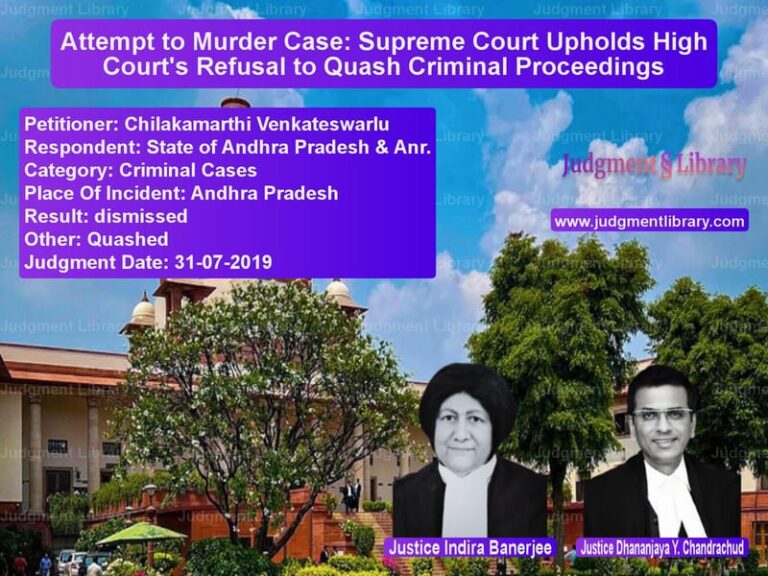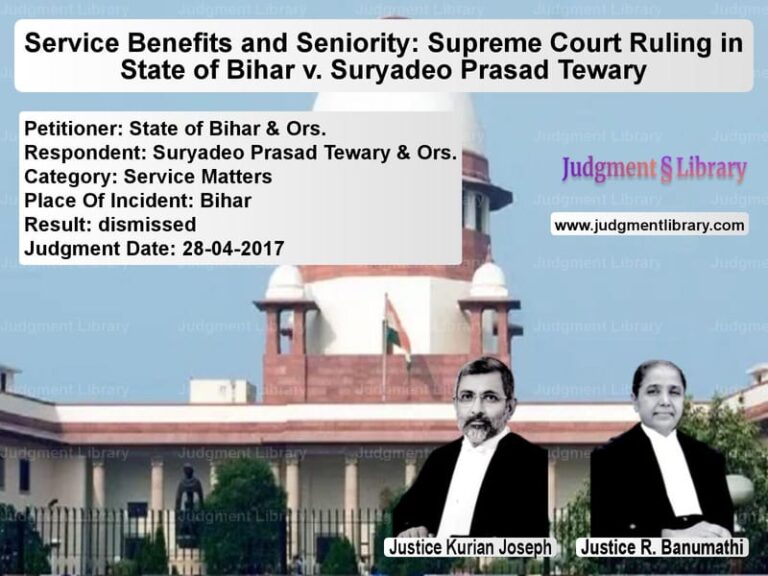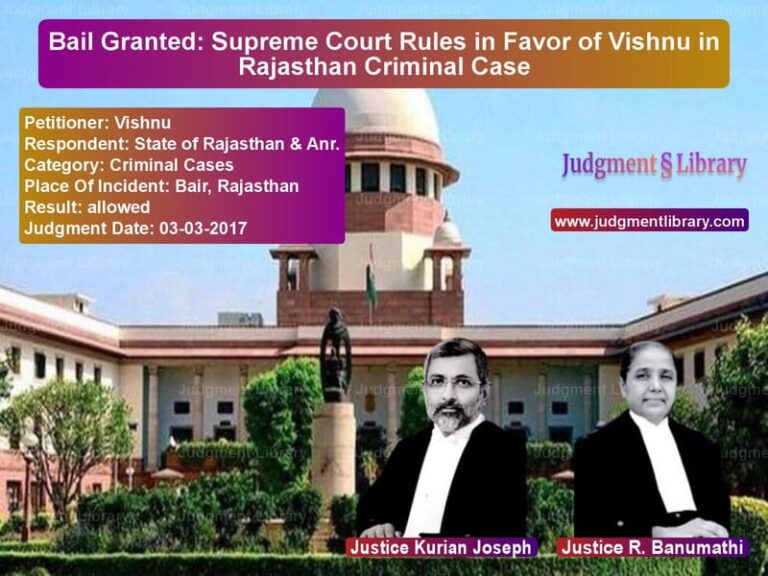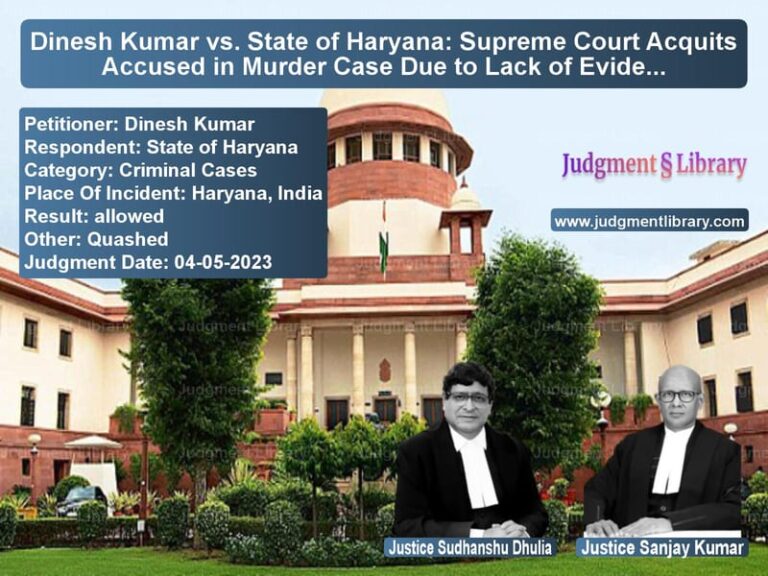Regulation of Chartered Accountants: Supreme Court’s Landmark Judgment on Multinational Firms
The Supreme Court of India, in its judgment on February 23, 2018, in the case of S. Sukumar vs. The Secretary, Institute of Chartered Accountants of India & Ors., addressed a critical issue concerning the regulation of Multinational Accounting Firms (MAFs) operating in India and their association with Indian Chartered Accountancy Firms (ICAFs). The case also included a writ petition filed by the Centre for Public Interest Litigation, raising concerns over alleged violations of the Chartered Accountants Act, 1949 (CA Act), the Companies Act, 1956, and Foreign Direct Investment (FDI) Policy by foreign accounting firms operating through Indian affiliates.
Background of the Case
The petitioners alleged that several foreign MAFs were providing accounting, auditing, taxation, and consultancy services in India through their affiliation with Indian Chartered Accountancy Firms (ICAFs), violating the CA Act and circumventing regulations intended to protect domestic firms.
The core allegations included:
- Foreign MAFs operating in India illegally through Indian CA firms, violating the Chartered Accountants Act, 1949.
- Violations of Sections 25 and 29 of the CA Act, prohibiting non-chartered accountants from engaging in accountancy.
- Illegal receipt of foreign funds and grants from global networks by Indian CA firms.
- Failure of regulatory authorities, including the Institute of Chartered Accountants of India (ICAI) and the Reserve Bank of India (RBI), to take strict action against these violations.
- Allegations of financial misconduct, particularly concerning PricewaterhouseCoopers (PwC) and its failure to detect financial frauds such as the Satyam Scam.
Key Issues Considered
- Are MAFs violating Indian laws by operating through Indian CA firms?
- Is there a need for an updated regulatory framework to oversee MAFs?
- Should stricter regulations be imposed on networking arrangements between Indian CA firms and foreign firms?
- Is there a violation of FDI policy in the accounting and auditing sector?
Arguments by the Petitioners
- The petitioners argued that foreign accounting firms were illegally operating in India under different structures, providing services that should be exclusively reserved for Indian CA firms.
- They cited the ICAI Expert Group Report (2011) and the Study Group Report (2003), which highlighted concerns over MAFs operating in India without proper registration.
- It was alleged that MAFs were engaged in profit-sharing and revenue transfers with their Indian affiliates, violating professional ethics.
- They demanded cancellation of registrations of Indian CA firms found to be violating the CA Act.
Arguments by the Respondents
- The respondents, including PWC India and other network firms, claimed that they were independent entities adhering to ICAI regulations.
- They argued that funds received from their global network were meant for capacity-building and quality enhancement, not for profit-sharing.
- They denied allegations of violating FDI policies and claimed that their operations were legally compliant.
Supreme Court’s Observations
The Supreme Court noted that the issue at hand had serious implications for the integrity of the auditing profession in India. The Court observed:
“There is a need for a robust regulatory framework to ensure transparency and accountability in the auditing profession. The violations alleged, if proven, could undermine the credibility of financial reporting in India.”
Final Judgment and Directions
The Supreme Court issued the following key directions:
- The Union of India was directed to constitute a three-member Committee of Experts to examine whether the CA Act and related regulations require amendments to better regulate MAFs and their Indian affiliates.
- The Enforcement Directorate (ED) was directed to complete its ongoing investigation into alleged FEMA violations by PwC and other firms.
- The ICAI was instructed to conduct a fresh investigation into the functioning of Indian CA firms affiliated with MAFs and take necessary disciplinary action.
- The Government of India was asked to consider establishing a separate regulatory authority for audit firms, similar to the Sarbanes-Oxley Act, 2002 in the United States.
Implications of the Judgment
The judgment has significant implications for the accounting and auditing profession in India:
- Increased Regulatory Scrutiny: MAFs and their Indian affiliates will face stricter oversight to ensure compliance with professional ethics and financial regulations.
- Stronger FDI Regulations: The judgment reinforces the prohibition of foreign investment in auditing firms, ensuring that domestic firms retain control over financial auditing services.
- Enhancing Transparency: The ruling aims to create a more transparent environment in financial reporting, benefiting businesses, investors, and regulators.
- Strengthening ICAI’s Role: The judgment highlights the need for ICAI to play a proactive role in enforcing professional standards and disciplinary actions.
Conclusion
The Supreme Court’s decision marks a crucial step in ensuring that India’s financial and auditing system remains transparent and free from undue foreign influence. By directing stricter regulations and oversight mechanisms, the Court has reinforced the principles of accountability and ethical conduct in the auditing profession.
Petitioner Name: S. SukumarRespondent Name: The Secretary, Institute of Chartered Accountants of India & Ors.Judgment By: Justice Adarsh Kumar Goel, Justice Uday Umesh LalitJudgment Date: 23-02-2018
Don’t miss out on the full details! Download the complete judgment in PDF format below and gain valuable insights instantly!
Download Judgment: S. Sukumar vs The Secretary, Insti Supreme Court of India Judgment Dated 23-02-2018.pdf
Direct Downlaod Judgment: Direct downlaod this Judgment
See all petitions in Corporate Governance
See all petitions in Company Law
See all petitions in unfair trade practices
See all petitions in Judgment by Adarsh Kumar Goel
See all petitions in Judgment by Uday Umesh Lalit
See all petitions in partially allowed
See all petitions in Remanded
See all petitions in supreme court of India judgments February 2018
See all petitions in 2018 judgments
See all posts in Corporate and Commercial Cases Category
See all allowed petitions in Corporate and Commercial Cases Category
See all Dismissed petitions in Corporate and Commercial Cases Category
See all partially allowed petitions in Corporate and Commercial Cases Category







